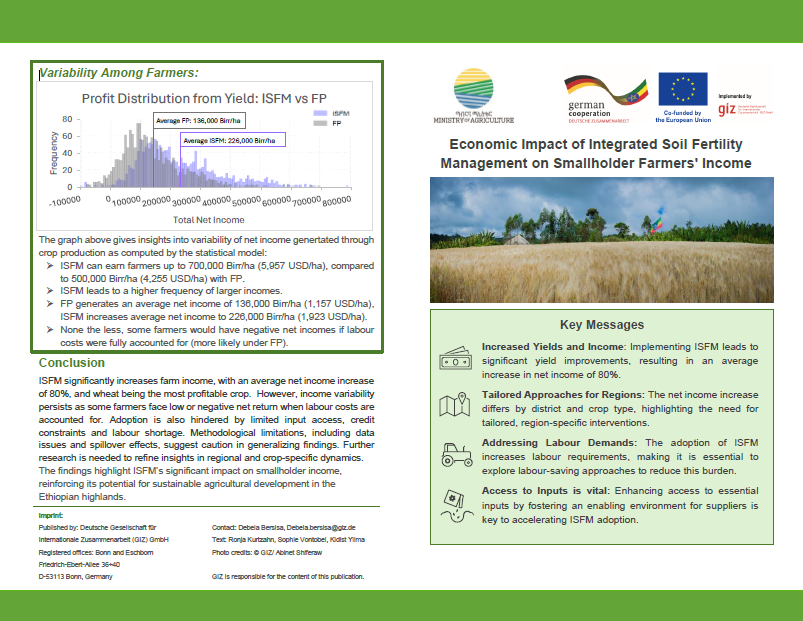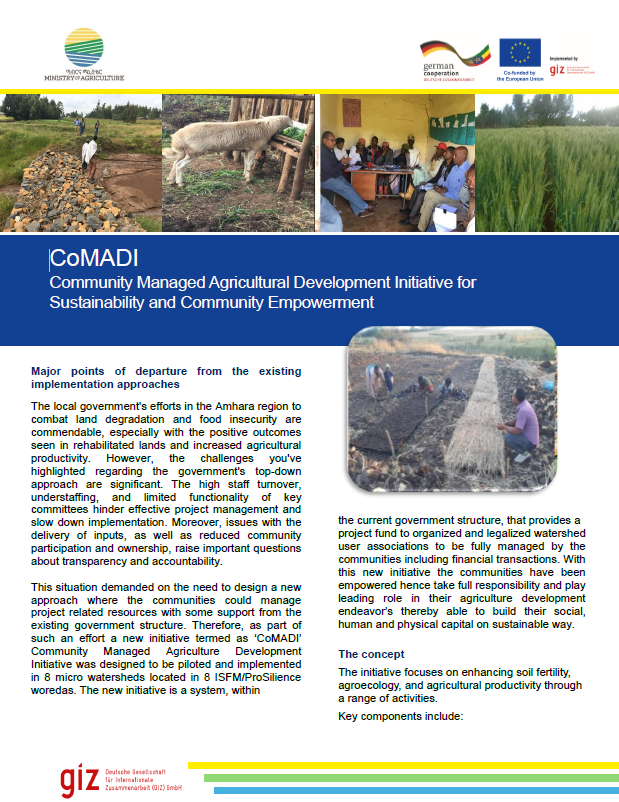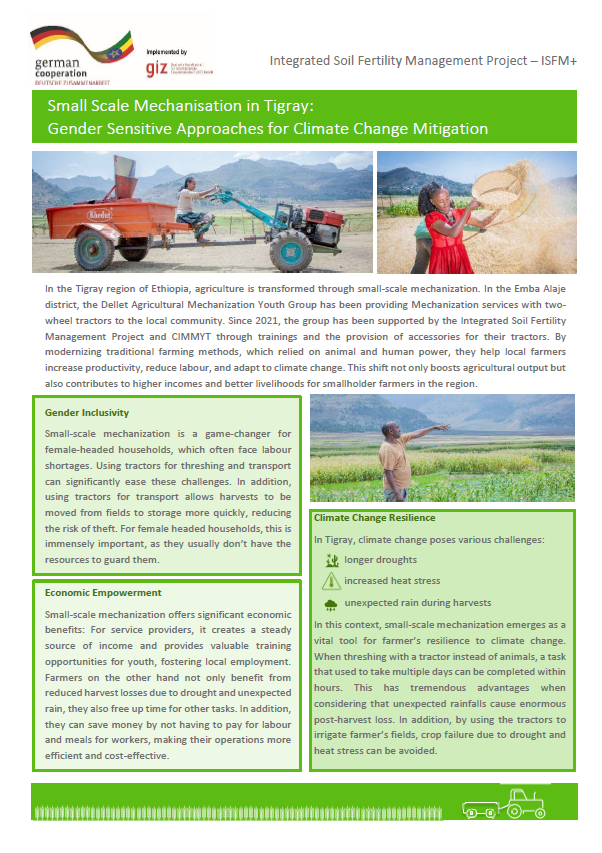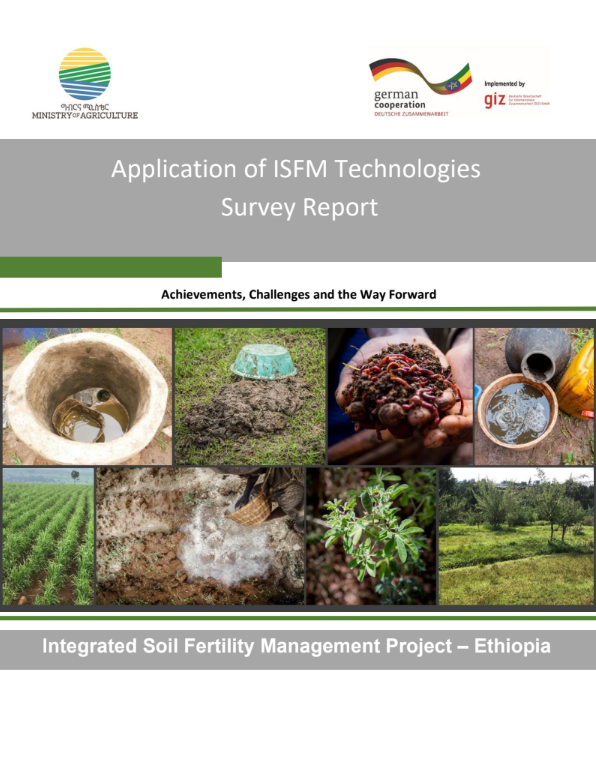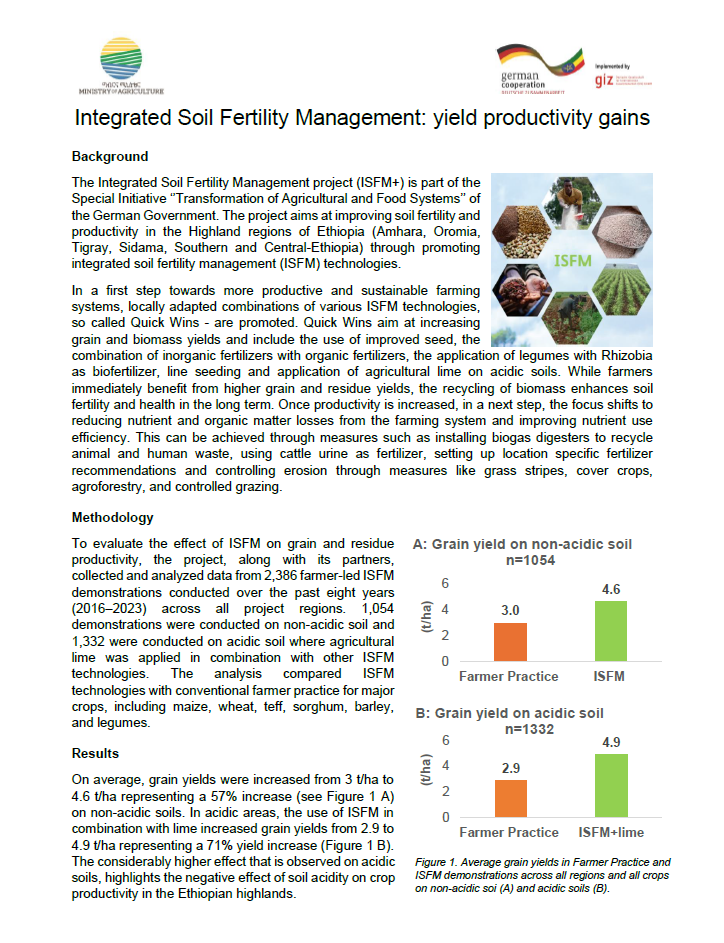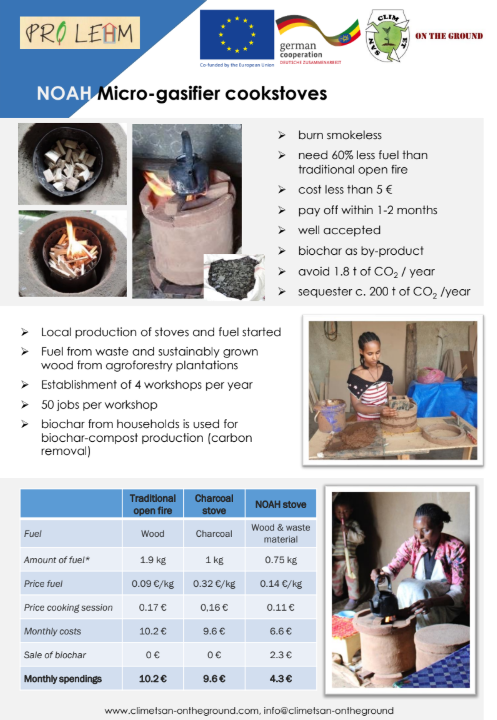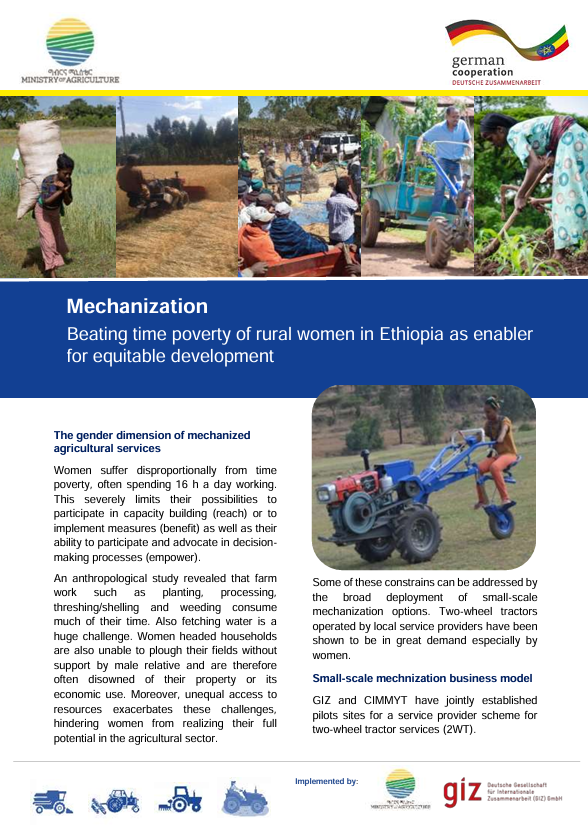Resource Library
Any CA4SH partner can submit a resource to the Library, where we hope to increase visibility of diverse work related to improving soil health globally.
Please send a web link or a file to communications@coalitionforsoilhealth.org if you would like to submit a resource.
Economic Impact of Integrated Soil FertilityManagement on Smallholder Farmers' Income
ISFM significantly increases farm income, with an average net income increase of 80%, and wheat being the most profitable crop. However, income variability persists as some farmers face low or negative net return when labour costs are accounted for. Adoption is also hindered by limited input access, credit constraints and labour shortage. Methodological limitations, including data issues and spillover effects, suggest caution in generalizing findings. Further research is needed to refine insights in regional and crop-specific dynamics. The findings highlight ISFM’s significant impact on smallholder income, reinforcing its potential for sustainable agricultural development in the Ethiopian highlands.
CoMADI | Community Managed Agricultural Development Initiative forSustainability and Community Empowerment
The local government's efforts in the Amhara region to combat land degradation and food insecurity are commendable, especially with the positive outcomes seen in rehabilitated lands and increased agricultural productivity. However, the challenges you've highlighted regarding the government's top-down approach are significant. The high staff turnover, understaffing, and limited functionality of key committees hinder effective project management and slow down implementation. Moreover, issues with the delivery of inputs, as well as reduced community participation and ownership, raise important questions about transparency and accountability.
Small Scale Mechanisation in Tigray: Gender Sensitive Approaches for Climate Change Mitigation
In the Tigray region of Ethiopia, agriculture is transformed through small-scale mechanization. In the Emba Alaje district, the Dellet Agricultural Mechanization Youth Group has been providing Mechanization services with twowheel tractors to the local community. Since 2021, the group has been supported by the Integrated Soil Fertility Management Project and CIMMYT through trainings and the provision of accessories for their tractors. By modernizing traditional farming methods, which relied on animal and human power, they help local farmers increase productivity, reduce labour, and adapt to climate change. This shift not only boosts agricultural output but also contributes to higher incomes and better livelihoods for smallholder farmers in the region.
Application of ISFM Technologies Survey Report
Agriculture is the primary economic activity in Ethiopia, with the majority of the population engaged in farming. However, food security remains a significant challenge, largely due to issues such as soil degradation and low fertility. Addressing soil fertility is essential for improving the livelihoods of Ethiopian farmers.To tackle this issue, the Integrated Soil Fertility Management (ISFM+) project promotes a set of integrated soil fertility management (ISFM) technologies and emphasizes peer learning and participatory approaches to enhance the effectiveness of these interventions. This report presents the findings of a 2024 survey aimed at tracking the dissemination, application, and adoption of ISFM technologies by smallholder farmers in the project’s intervention areas.
Integrated Soil Fertility Management: Yield Productivity Gains
The Integrated Soil Fertility Management project (ISFM+) is part of the Special Initiative ‘’Transformation of Agricultural and Food Systems’’ of the German Government. The project aims at improving soil fertility and productivity in the Highland regions of Ethiopia (Amhara, Oromia, Tigray, Sidama, Southern and Central-Ethiopia) through promoting integrated soil fertility management (ISFM) technologies.
NOAH | Micro-gasifier cookstoves
➢ Local production of stoves and fuel started
➢ Fuel from waste and sustainably grown wood from agroforestry plantations
➢ Establishment of 4 workshops per year
➢ 50 jobs per workshop
➢ biochar from households is used for biochar-compost production (carbon removal)
Mechanization | Beating time poverty of rural women in Ethiopia as enabler for equitable development
Women suffer disproportionally from time poverty, often spending 16 h a day working. This severely limits their possibilities to participate in capacity building (reach) or to implement measures (benefit) as well as their ability to participate and advocate in decision-making processes (empower).
An anthropological study revealed that farm work such as planting, processing, threshing/shelling and weeding consume much of their time. Also fetching water is a huge challenge. Women headed households are also unable to plough their fields without support by male relative and are therefore often disowned of their property or its economic use. Moreover, unequal access to resources exacerbates these challenges, hindering women from realizing their full potential in the agricultural sector.
Some of these constrains can be addressed by the broad deployment of small-scale mechanization options. Two-wheel tractors operated by local service providers have been shown to be in great demand especially by women.
Analyses des effets socio-économiques etenvironnementaux des pratiques agroécologiques
Le guide méthodologique fournit un aperçu des analyses économiques et environnementales les plus récentes, répondant au besoin de ProSol et pertinents pour des contextes de développement plus larges. Il explique les méthodologies proposées, leurs indicateurs et résultats clés ainsi que les besoins en données et fournit des informations sur le contexte d’application. Le guide comprend également des conseils et des astuces sur ce qu’il faut prendre en compte avant d’entreprendre une étude. Des idées pratiques sur la façon d’impliquer les parties prenantes concernées dans les différentes étapes d’une analyse permettent d’adapter les études aux besoins du groupe cible et d’assurer que les résultats sont utiles aux parties prenantes. Grâce à ce produit, les collègues des pays partenaires de ProSol devraient être en mesure d’identifier leurs principales questions de recherche et le but de telles analyses, et de formuler à l’avance le type de résultats qu’ils souhaiteraient obtenir. Ils devraient avoir une compréhension de base des méthodologies d’analyse économique et écologique existantes et savoir quelle méthodologie pourrait convenir à leurs besoins spécifiques. Ils devraient se sentir en mesure de monter un dossier d’analyse et lancer un appel d’offres et sélectionner un partenaire de recherche compétent pour éventuellement se lancer dans une étude personnalisée.
Benin country report on Measuring Agroecology and its Performance (MAP): TAPE application in the context of the Global Programme “Soil Protection and Rehabilitation for Food Security” (ProSoil)
Since 2015, ProSoil has been empowering communities to address environmental and food-security challenges by implementing interventions, such as agroforestry, conservation agriculture, soil and water management, integrated pest management, and policy advice. Through effective collaboration with smallholder farmers, experts and decision makers, ProSoil has fostered a landscape transition towards sustainable farming practices. TAPE results from 120 farms that actively participated in ProSoil activities were compared with 120 farms that had not participated in ProSoil activities. To specifically assess the contribution of agroecology to improved soil health within ProSoil farms, as opposed to the comparison farms, TAPE was complemented with the Land Degradation Surveillance Framework (LDSF) methodology to gain more detailed insights into the contribution of agroecological integration to physiochemical soil characteristics.
Ethiopia country report on Measuring Agroecology and its Performance (MAP): TAPE application in the context of the Global Programme “Soil Protection and Rehabilitation for Food Security” (ProSoil)
Environmental deterioration, ill health, and premature mortality are interrelated, and all are significantly influenced by global food systems. Currently, there is growing interest in switching to a sustainable system that ensures the production of diversified food products while ensuring the regenerative use of natural resources and addressing societal needs. Agroecology – a transdisciplinary approach simultaneously applying ecological and social concepts and promoting sustainable agriculture and food systems – addresses these needs and has therefore received global attention. In widely promoting agroecology, there is also a need to assess its level of integration and effectiveness. To this end, the Tool for Agroecology Performance Evaluation (TAPE) – a global analytical framework developed with contributions from numerous international organizations and with the Food and Agriculture Organization of the United Nations (FAO) serving as the host – is widely employed to assess the multidimensional performance of agroecology and to generate evidence.
Completing the integrated soil fertility management equation: Latest trends in research and scaling for organic and auxiliary inputs
Snapshot of content in technology profiles as related to potential for sustainable intensification, enhanced profitability, emission reduction, and policy mechanisms to promote access and use.
Kenya country report on Measuring Agroecology and its Performance (MAP): TAPE application in the context of the Global Programme “Soil Protection and Rehabilitation for Food Security” (ProSoil)
As agroecology is increasingly viewed as a promising approach to render agricultural and food systems more sustainable, there is growing interest in assessing both the level of agroecological integration and the contribution of agroecology to achieving societal goals. To address both points of interest, the FAO’s Tool for Agroecology Performance Evaluation (TAPE) was applied in the context of the Global Programme “Soil Protection and Rehabilitation for Food Security” (ProSoil) in three Kenyan counties (Bungoma, Kakamega and Siaya). Since 2015, ProSoil has been building community capacity to implement agroecological farming practices. The application of TAPE aimed at assessing the degree to which ProSoil’s interventions contributed to agroecological transitions among beneficiary households, and how the degree of agroecological integration correlates with multidimensional performance. TAPE results from 101 farms that have actively participated in ProSoil activities were compared with 100 farms that had not actively participated in ProSoil activities, serving as a comparison group. These comparison farms were selected from households targeted for the DeSIRA (EU initiative “Development Smart Innovation through Research in Agriculture”) project “Enhancing soils and agroecology for resilient agri-food systems in Sub-Saharan Africa” (ProSilience), co-funded by the EU and BMZ and embedded within ProSoil.
Avantages économiquesdes pratiques agroécologiques en matière de sol : Données produites par ProSol
Cette compilation de données économiques examine les études et les rapports sur les activités de ProSol qui ont été menées entre 2014 et 2023, dont beaucoup ont été réalisées en partenariat avec l’Initiative sur l’économie de la dégradation des terres (ELD) (www.eld-initiative.org). Elles ont été analysées en fonction de leurs avantages sociaux, environnementaux et économiques.
Agroecology Leadership Academy 2024: Lessons Learnt
The Agroecology Leadership Academy is conducted with financial support from the European Union (EU) as part of the EU co-funded Action “ProSilience: Enhancing soils and agroecology for resilient agrifood systems in Sub-Saharan Africa”. ProSilience is integrated into the Global Programme “Soil Protection and Rehabilitation for Food Security” (ProSoil) commissioned by the German Federal Ministry for Economic Cooperation and Development (BMZ) and implemented by the Deutsche Gesellschaft für Internationale Zusammenarbeit (GIZ) GmbH, As a core part of the Academy, the country teams from the seven countries were supported to put transformation initiatives into actions. Within a few months, the participants catalyzed effective action by advancing national policies, bringing a wide range of stakeholders together, spreading hands-on knowledge and developing innovative media products.
This document summarizes Lessons Learnt on the base of internal reflection and harvesting workshops, a meeting with country facilitators, a survey by participants and focus group interviews with participants. It aims to openly share experiences with other practitioners interested in setting up similar programmes.
Assessing Agroecological Transitions in Ethiopia with the Tool for Agroecology Performance Evaluation (TAPE)
The Measuring Agroecology and its Performance (MAP) project is a collaborative initiative of the Agroecology TPP aimed at fostering agroecological transitions by generating evidence of agroecology’s contribution to societal goals. The MAP project is funded by the German Federal Ministry for Economic Cooperation and Development (BMZ), co-funded by the European Union (EU) and supported by the Deutsche Gesellschaft für Internationale Zusammenarbeit (GIZ) GmbH. The Tool for Agroecology Performance Evaluation (TAPE) was applied in 2024 in three Ethiopian districts (Hula, Sodo-Zuria and Walmara) in the context of the Global Programme “Soil Protection and Rehabilitation for Food Security” (ProSoil), operating as ISFM+ in Ethiopia. To assess the contribution of ProSoil to agroecological transitions of farmers and their multidimensional performance, TAPE was applied with 99 households that actively participated in ProSoil activities (ProSoil group) and with 99 households that had not actively participated in the programme (comparison group).
Assessing Agroecological Transitions in Benin with the Tool for Agroecology Performance Evaluation (TAPE)
The Measuring Agroecology and its Performance (MAP) project is a collaborative initiative of the Agroecology TPP aimed at fostering agroecological transitions by generating evidence of agroecology’s contribution to societal goals. The MAP project is funded by the German Federal Ministry for Economic Cooperation and Development (BMZ), co-funded by the European Union (EU) and supported by the Deutsche Gesellschaft für Internationale Zusammenarbeit (GIZ) GmbH. The Tool for Agroecology Performance Evaluation (TAPE) was applied in 2024 in four municipalities (Za-Kpota, Bantè, Sinendé and Kandi) in Benin in the context of the Global Programme “Soil Protection and Rehabilitation for Food Security” (ProSoil). To assess the contribution of ProSoil to agroecological transitions of farmers and their multidimensional performance, TAPE was applied with 120 households that actively participated in ProSoil activities (ProSoil group) and with 120 households that had not actively participated in the programme (comparison group).
Assessing Agroecological Transitions in Madagascar with the Tool for Agroecology Performance Evaluation (TAPE)
The Measuring Agroecology and its Performance (MAP) project is a collaborative initiative of the Agroecology TPP aimed at fostering agroecological transitions by generating evidence of agroecology’s contribution to societal goals. The MAP project is funded by the German Federal Ministry for Economic Cooperation and Development (BMZ), co-funded by the European Union (EU) and supported by the Deutsche Gesellschaft für Internationale Zusammenarbeit (GIZ) GmbH. The Tool for Agroecology Performance Evaluation (TAPE) was applied in 2024 in four municipalities (Belobaka, Katsepy, Manerinerina and Tsaramandroso) in the Boeny Region of Madagascar in the context of the Global Programme “Soil Protection and Rehabilitation for Food Security” (ProSoil). To characterize farmers’ transition to agroecology and assess the correlation between agroecological integration and multidimensional performance, TAPE was applied with 200 households in the intervention area of ProSoil.
Assessing Agroecological Transitions in Kenya with the Tool for Agroecology Performance Evaluation (TAPE)
The Measuring Agroecology and its Performance (MAP) project is a collaborative initiative of the Agroecology TPP aimed at fostering agroecological transitions by generating evidence of agroecology’s contribution to societal goals. The MAP project is funded by the German Federal Ministry for Economic Cooperation and Development (BMZ), co-funded by the European Union (EU) and supported by the Deutsche Gesellschaft für Internationale Zusammenarbeit (GIZ) GmbH. The Tool for Agroecology Performance Evaluation (TAPE) was applied in 2024 in three Kenyan counties (Bungoma, Kakamega and Siaya) in the context of the Global Programme “Soil Protection and Rehabilitation for Food Security” (ProSoil). To assess the contribution of ProSoil to agroecological transitions of farmers and their multidimensional performance, TAPE was applied with 101 households that actively participated in ProSoil activities (ProSoil group) and with 100 households that had not actively participated in the programme (comparison group).
The Agroecology Leadership Academy in a nutshell
At the Agroecology Leadership Academy, participants develop their skills and build on their experience as leaders in agroecological transformation. They are equipped to navigate complex systems and support social transformation. Through joint initiatives, the teams help enhance agroecological transformation in their countries. Our learning methods include blending the “what” (agroecological transformation) with the “how” (leadership), using interactive experiences and action-based methodologies, and co-creating a collective learning space for joint action.
Enabling Coherence for Sustainable Land Management and Climate Policy
This synthesis paper is a product of a first workshop on upscaling the potential of soil organic carbon for climate action, held in April 2020. Experts came together for the “Climate-Soil Community of Practice” to disseminate information on successful land management and soil carbon projects, highlight good practices for overcoming adoption barriers and strengthen the case for sustainable land management as a key to effective climate action. This synthesis paper presents the outcomes of the presentations and discussions derived during the event on the linkages between sustainable land management and climate change. It aims to provide guidance on a holistic approach to land use and climate policy processes within the scope of international agendas and national actions. It offers entry points at the national level and presents good practices to current barriers in aligning these two closely interconnected, yet often separately treated processes.

